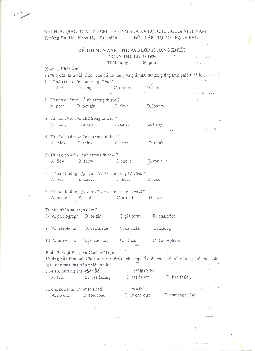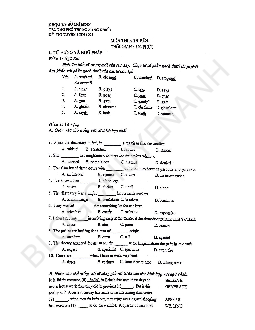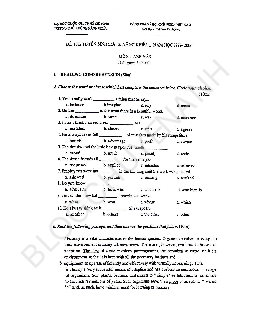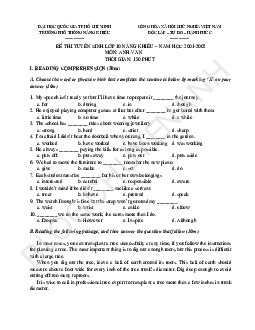



Preview text:
QUẢNG TRỊ
SECTION I: LISTENING (2. 0 points)
Part I: Listen to a woman talking to a policeman. For questions 1-4, choose A, B or C. You will hear
the conversation twice. (1. 0 point)
1. How much money was in the bag? A. £20 B. £40 C. £50 ●
Thông tin: No, there wasn't. I usually have forty or fifty pounds in it, but today I think there was only abo ut twenty. ●
Tạm dịch: Không nhiều lắm. Tôi thường có bốn mươi hoặc năm mươi bảng trong túi, nhưng hôm nay tôi
nghĩ chỉ có khoảng hai mươi (bảng). 2. What else was in the bag? A. credit card B. driving licence C. gloves ●
Thông tin: Just my gloves. I left my credit card and driving license at home. ●
Tạm dịch: Chỉ có đôi găng tay của tôi. Tôi đã để thẻ tín dụng và giấy phép lái xe ở nhà.
3. What time did the woman lose the bag? A. 9.30 B. 10.00 C. 10.30 ●
Thông tin: Well, I left home about nine thirty and the bus takes half an hour, so I lost it about ten o'clock. ●
Tạm dịch: Chà, tôi rời nhà khoảng chín giờ ba mươi và đi xe buýt mất nửa tiếng, vì vậy tôi mất túi lúc kh oảng mười giờ.
4. The police will telephone her in the. A. morning B. afternoon C. evening ● Thông tin:
Woman: Sorry, I'm going out until the evening. Could you phone before ten in the morning?
Man : Certainly. I'll call then. ● Tạm dịch:
Người phụ nữ: Xin lỗi, tôi sẽ đi ra ngoài cho đến tối. Anh có thể gọi điện thoại trước mười giờ sáng không?
Người đàn ông: Chắc chắn. Tôi sẽ gọi cho bà.
Part 2: You will hear some information about an air museum. Listen and complete questions 5-8. You
will hear the information twice. (1. 0 point)
Write NO MORE THAN TWO WORDS AND/OR A NUMBER for each answer Museum is near village of: (5) Cherford Summer opening time:
(6) 10 a. m. to 7.15 p. m. Price of family ticket: (7) £ 18 Day for plane trips: (8) Sunday(s)
SECTION II: USE OF LANGUAGE (3 points)
Choose the correct answer A, B, C or D to each of the following questions. 1. Many people
morning exercise to keep fit and stay healthy. A. play B. do C. go D. make
● Do exercise: tập thể dục 2. I’m from Viet Nam. My language is Vietnamese. A. foreign B. mother C. first D. old
● Mother language: tiếng mẹ đẻ 3. We can see many
with two loads of fruits on their shoulders on the streets in Ha Noi. A. businessmen B. taxi drivers C. tour guides D. street vendors
● Businessmen /ˈbɪznəsmæn/ (n) doanh nhân (nam)
● Taxi driver /ˈtæksi draɪvər/(n) tài xế taxi
● tour guide /tʊr ɡaɪd/ (n) hướng dẫn viên du lịch
● Street vendor /striːt ˈvendər/ (n) người bán hàng rong
4. He has never caused any accidents before because he always drives . A. care B. careful C. careless D. carefully
● Care /ker/ (n) sự quan tâm, sự chăm sóc
● Careful /ˈkerfl/ (adj) cẩn thận
● Careless/ˈkerləs/ (adj) bất cẩn
● Carefully /ˈkerfəli/ (adv) một cách cẩn thận
5. The traditional craft has been from generation to generation. A. passed down B. pulled down C. turned down D. closed down
● Pass down: truyền nối (từ thế hệ này sang thế hệ khác) ● Pull down: phá hủy ● Turn down: từ chối
● Close down: ngừng hoạt động 6. I like reading books
tell about different countries and cultures. A. which B. who C. whom D. whose Mệnh đề quan hệ: ●
‘who’ Làm chủ ngữ hoặc tân ngữ, thay thế cho danh từ chỉ người. ●
‘whom’ Làm tân ngữ, thay thế cho danh từ chỉ người. ●
‘which’ Làm chủ ngữ hoặc tân ngữ, thay thế cho danh từ chỉ vật.
● ‘whose’ Chỉ sở hữu cho người và vật
7. My smartphone is old. I wish I a new one. A. have B. will have C. am having D. had
● Câu ước: S + wish(es) + (that) + S + V-ed/were/p2 8. She is bilingual English and German. A. on B. at C. in D. with ● In + ngôn ngữ 9. The earth revolves around sun. A. the B. a C. an D. 0 (no article)
Cách sử dụng mạo từ ‘the’:
● Khi vật thể hay nhóm vật thể là duy nhất hoặc được xem là duy nhất
● Trước một danh từ, với điều kiện danh từ này vừa mới được đề cập trước đó.
● Trước một danh từ, với điều kiện danh từ này được xác định bằng một cụm từ hoặc một mệnh đề.
● Trước một danh từ chỉ một vật riêng biệt
→ Những gì đã được xác định. 10. Our teacher expected us on the lessons. A. focus B. to focus C. focusing D. focused
● Expect SO to V /ɪkˈspekt/(v) mong chờ ai làm gì
Choose the option A, B, C or D that best completes each of the exchanges. 11.
- An: “Let’s visit Son Doong Cave this weekend.” - Bob: “ ”
A. No, you can’t. Không, tôi không thể
B. Because I’m busy. Bởi vì tôi bận
C. That’s a good idea. Đó là một ý kiến hay
D. Don’t worry. Đừng lo 12.
- Mike: “Sorry I forgot your birthday.” - Maria: “ ” A. Great! Tuyệt!
B. Don’t worry about it. Đừng lo
C. I can’t remember. Tôi không thể nhớ
D. I never know. Tôi không bao giờ biết
Choose the underlined part A, B, C or D that needs correction in each of the following questions. 13.
The chidren had finished their homework before they go to bed. A B C D
● Trước ‘before’ chia QKHT, sau ‘before’ chia QKĐ ● Go → went 14.
If Dad is here now, he would know what to do. A B C D
● Câu điều kiện loại 2: Điều kiện không có thật ở hiện tại: If + S + V2/Ved/were, S + would/could/should + V ● Is → were
SECTION III: READING (2. 5 points)
Part I: Read the following passage and choose the correct answer A, B, C or D that best fits the blanks. (1. 25 points) LINE DANCING
Thousands of people in Britain (1) _
a new hobby - line dancing. In almost every town, you
will find clubs and classes for this new activity.
‘Line dancing is easy to learn. If you have two feet and can walk, then you can do it!’ Fiona Lever, a teacher, says.
‘You don’t need a partner because you dance (2)
groups. It’s the best way to (3)_ new friends. In my classes,
there are young and old people. The boys like it (4)
they can make a lot of noise with their feet during the dances’’
When did line dancing begin? Most people think it started about fifteen years ago (5) _ American
country music became famous in Britain. 1. A. has B. have C. is having D. has had
● Thousands of N(số nhiều) + V (chia số nhiều) 2. A. at B. to C. in D. on ● In groups: trong nhóm 3. A. make B. take C. talk D. play ● Make friends: kết bạn 4. A. despite B. because C. however D. therefore
● Despite + N/V-ing: mặc dù ● Because + S + V: bởi vì ● However: tuy nhiên ● Therefore: do đó 5. A. why B. where C. which D. when
● Mệnh đề quan hệ ‘when’ WHEN: thay thế từ chỉ thời gian, thường thay cho từ then
….N (time) + WHEN + S + V … (WHEN = ON / IN / AT + WHICH)
Part 2: Read the following passage and choose the correct answer A, B, C or D to each of the
questions. (1. 25 points)
Out in the Pacific Ocean, 3,700 kilometers from Los Angeles, are the islands of Hawaii, the fiftieth state
of the United States, with its area of 16,700 square kilometers.
The first Hawaiians arrived from other Pacific islands sometime around 100 A.D. Then in 1778,
Captain Cook visited Hawaii. He put the islands on his maps of the Pacific Ocean. Then more ships
knew Hawaii and began stopping there for supplies.
In 1820, a small group of people from the eastern United States came to teach the Hawaiian people about
Christianity. They started farms to grow sugar cane and pineapples. Because there were not enough people
to do all the farm work, farm owners brought in Asians - Chinese, Japanese, and Filipinos. Later Koreans,
Portuguese, and Puerto Ricans also came. More people came from the U.S. mainland and from other
Pacific islands, and Hawaii became an island with traditions from several countries. People from the
various national groups have married each other, so today the groups are partly mixed. 6. Hawaii is square kilometers in area. A. 16,700 B. 1,820 C. 2,500 D. 3,700
● Key: the islands of Hawaii, the fiftieth state of the United States, with its area of 16,700 square kilometers.
7. More ships knew Hawaii through
and stopped there for supplies. A. Filipinos B. Christians B. Captain Cook’s maps D. Japanese visitors
● Key: The first Hawaiians arrived from other Pacific islands sometime around 100 A.D. Then in 1778, Captain Cook visited Hawaii.
8. In the early 19th century, many Asians were taken to Hawaii . A. to go fishing B. to do the farm work B. to visit attractions D. to be holidaymakers
● Key: Because there were not enough people to do all the farm work, farm owners brought in Asians - Chinese, Japanese, and Filipinos.
9. Today the various national groups are .
A. living in different societies B. partly mixed C. completely separated D. completely mixed
● Key: People from the various national groups have married each other, so today the groups are partly mixed. 10.
According to the passage, which of the following statements is NOT true?
A. Hawaii is in the Pacific Ocean, 3,700 kilometers from Los Angeles.
B. Hawaii is the fiftieth state of the United States.
C. Captain Cook came to Hawaii in 1778.
D. All Hawaiian people have come from Asia.
● Key: Do người Hawaii không chỉ đến từ châu Á
SECTION IV: WRITING (2. 0 points)
Part 1: Rearrange the given words to make meaningful sentences. (1. 0 point)
Write your answers in the space provided.
1. is / too busy / her children. / She / to take care of /
→ She is too busy to take care of her children.
● Too + adj + to Vinf: quá đến nỗi không thể làm gì
2. suggest that/ I / deforestation. / should control / the government/
→ I suggest that the government should control deforestation.
● Câu đề nghị: S + suggest that + S + (should) + Vinf
3. enjoyed / bad weather, / our holiday. / the / we / In spite of /
→ In spite of the bad weather, we enjoyed our holiday.
● In spite of + N/V-ing: mặc dù
4. stopped / when / We / turned red. / the traffic lights /our car /
→ We stopped our car when the traffic lights turned red.
Part 2: Rewrite the following sentences without changing their meaning, beginning with the words
given. (1. 0 point)
Write your answers in the space provided.
5. No mountains in Western Europe are higher than Mount Blanc.
→ Mount Blanc is the highest mountain in Western Europe. Cấu trúc So sánh nhất
● Tính từ ngắn: S + V + the + adj + EST ….
● Tính từ dài: S + V + the MOST + adj …
6. “I’m taking an online course now,” Mary told me.
→ Mary told me that she was taking an online course then.
● Câu tường thuật: S + told (SO) + (that) + S + V( lùi thì)
7. David lived in a village when he was small, but now he lives in a big city.
→ David used to live in a village when he was small, but now he lives in a big city.
● Used to + Vinf: đã từng làm gì (trong QK)
8. People say that Da Nang is one of the most liveable cities in Viet Nam.
→ It is said that Da Nang is one of the most liveable cities in Viet Nam. Cấu trúc: ●
Chủ động: People (they; some one) + say (said) + that + Clause ●
Bị động: It is said that + S2 + V … HẾT




